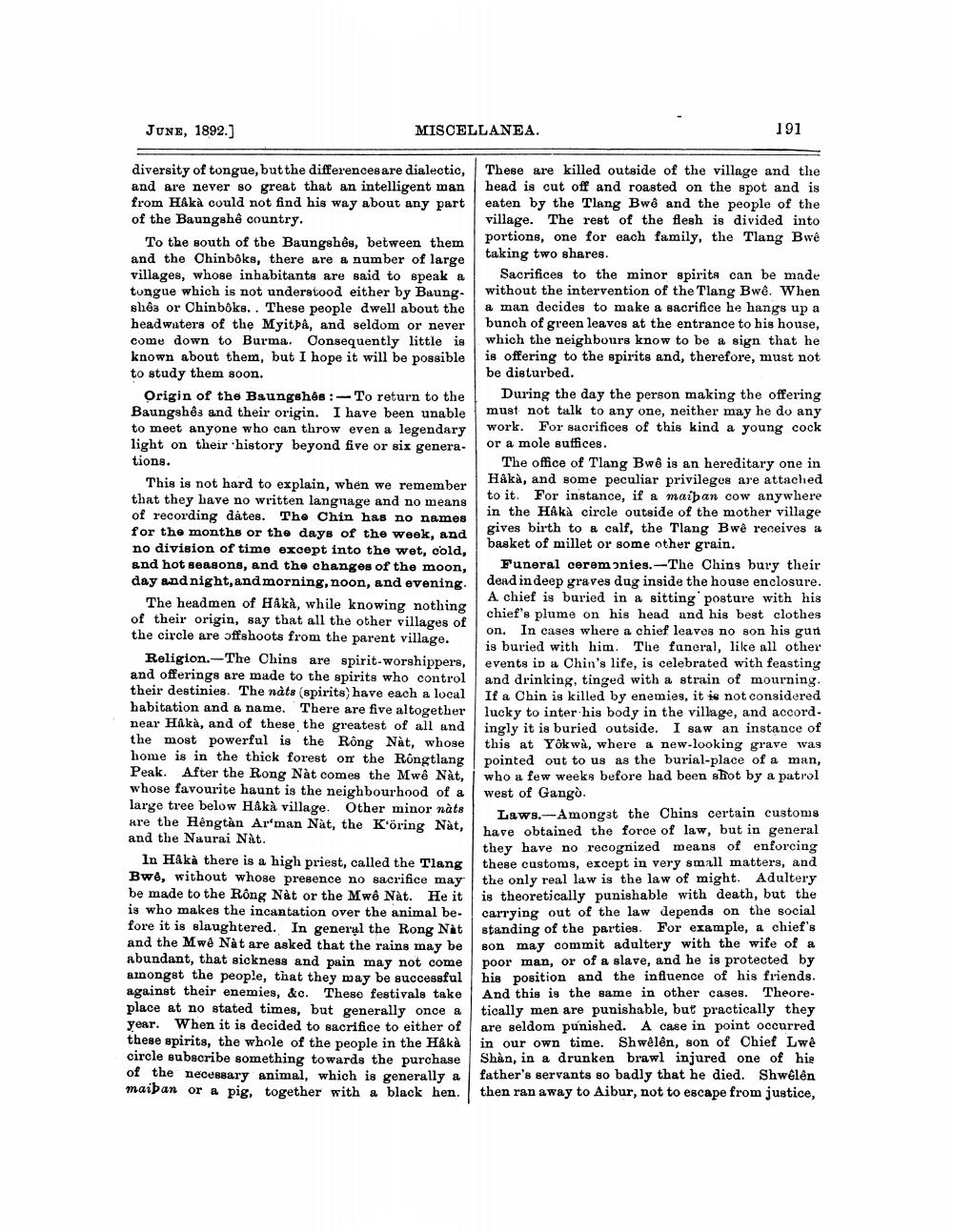________________
JUNE, 1892.]
MISCELLANEA.
191
diversity of tongue, but the differences are dialectic, These are killed outside of the village and the and are never so great that an intelligent man head is cut off and roasted on the spot and is from Haka could not find his way about any part eaten by the Tlang Bwê and the people of the of the Baungshe country.
village. The rest of the flesh is divided into To the south of the Baungshês, between them
portions, one for each family, the Tlang Bwê and the Chinbôks, there are a number of large
taking two shares. villages, whose inhabitants are said to speak a Sacrifices to the minor spirits can be made tongue which is not understood either by Baung- without the intervention of the Tlang Bwe. When shea or Chinboks. . These people dwell about the a man decides to make a sacrifice he hangs headwaters of the Myitpa, and seldom or never
bunch of green leaves at the entrance to his house, come down to Burma. Consequently little is which the neighbours know to be a sign that he known about them, but I hope it will be possible is offering to the spirits and, therefore, must not to study them soon.
be disturbed. Origin of the Baungshes :- To return to the During the day the person making the offe Baungshes and their origin. I have been unable must not talk to any one, neither may he do any to meet anyone who can throw even a legendary
work. For sacrifices of this kind a young cock light on their history beyond five or six genera.
or a mole suffices. tions.
The office of Tlang Bwê is an hereditary one in This is not hard to explain, when we remember
Håkà, and some peculiar privileges are attached that they have no written language and no means
to it. For instance, if a maiban cow anywhere of recording dates. The Chin has no names
in the Håka circle outside of the mother village for the months or the days of the week, and
gives birth to a calf, the Tlang Bwê receives a no division of time except into the wet, cold,
basket of millet or some other grain. &nd hot seasons, and the changes of the moon,
Funeral ceremonies.- The Ching bury their day and night, and morning, noon, and evening.
dend in deep graves dug inside the house enclosure. The headmen of Håkà, while knowing nothing
A chief is buried in a sitting posture with his of their origin, say that all the other villages of
chief's plume on his head and his best clothes the circle are offshoots from the parent village.
on. In cases where a chief leaves no son his gun
is buried with him. The funeral, like all other Religion.-The Chins are spirit-worshippers, events in a Chin's life, is celebrated with feasting and offerings are made to the spirits who control and drinking, tinged with a strain of mourning. their destinies. The nats (spirits) have each a local If a Chin is killed by enemies, it is not considered habitation and a name. There are five altogetherlucky to inter his body in the village, and accord. near Hakà, and of these the greatest of all and ingly it is buried outside. I saw an instance of the most powerful is the Rông Nàt, whose this at Yôkwa, where a new-looking grave was home is in the thick forest on the Rõngtlang pointed out to us as the burial-place of a man, Peak. After the Rong Nàt comes the Mwê Nát, who a few weeks before had been shot by a patrol whose favourite haunt is the neighbourhood of a west of Gangò. large tree below Håkà village. Other minor nats are the Héngtan Arman Nàt, the Köring Nat,
Laws. Amongst the Chins certain customs
have obtained the force of law, but in general and the Naurai Nàt.
they have no recognized means of enforcing In Hakà there is a high priest, called the Tlang these customs, except in very small matters, and Bwe, without whose presence no sacrifice may the only real law is the law of might. Adultery be made to the Rông Nåt or the Mwê Nat. He it is theoretically punishable with death, but the is who makes the incantation over the animal be. carrying out of the law depends on the social fore it is slaughtered. In general the Rong Nat standing of the parties. For example, a chief's and the Mwe Nat are asked that the rains may be son may commit adultery with the wife of a abundant, that sickness and pain may not come poor man, or of a slave, and he is protected by amongst the people, that they may be successful his position and the influence of his friends. against their enemies, &c. These festivals take And this is the same in other cases. Theore. place at no stated times, but generally once a tically men are punishable, but practically they year. When it is decided to sacrifice to either of are seldom punished. A case in point occurred these spirits, the whole of the people in the Håkà in our own time. Shwêlên, son of Chief Lwè circle subscribe something towards the purchase Shàn, in a drunken brawl injured one of his of the necessary animal, which is generally a father's servants so badly that he died. Shwêlên maiban or a pig, together with a black hen. then ran away to Aibur, not to escape from justice,




